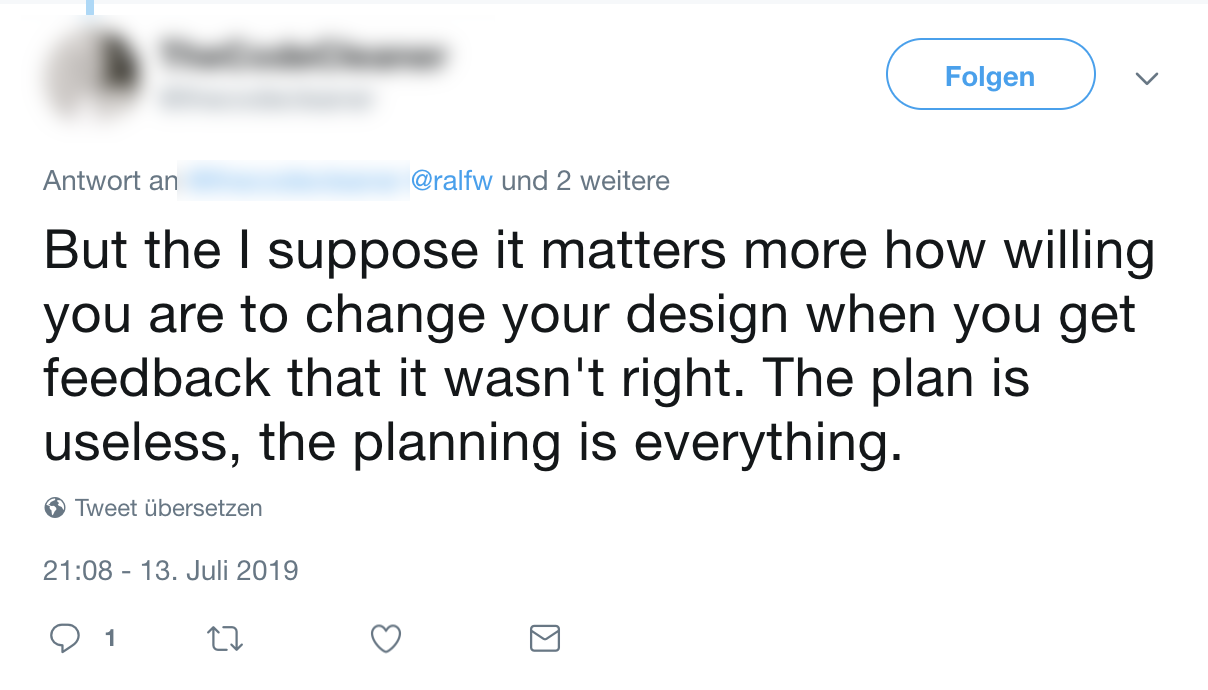
Against pseudo-wisdom
Apart from esoteric or „spiritual“ circles it seems a trait of software development to use „pearls of wisdom“ to impart one’s professionalism. „Appeal to authority“ likewise is in broad use.
It was this tweet which made that clear to me once more:

And I’m sick and tired of it.
Because it’s not wisdom, but pseudo-wisdom. Or more bluntly: it’s bullshit.
The reason is simple: Such „pearls of wisdom“ are…
- often used out of their original context and/or
- incorrectly quoted and/or
- without knowing the current context of the „beneficiary“.
The author of the above tweet wanted to allude to Dwight D. Eisenhower who said, I guess:
In preparing for battle I have always found that plans are useless, but planning is indispensable.
This establishes the original context: warfare. But was the tweet author aware of that? I don’t know.
The obvious current general context of the Twitter conversation wasn’t warfare, though, but software development. The question thus is: Does the quote apply? Is software development like war?
To some it might seem so, but I fundamentally disagree:
- In warfare deception plays a big role, not so in software development.
- In warfare secrecy plays a big role, not so in software development.
- In warfare there is no will to cooperation between the warring parties.
Sure, there is a lack of information and the existence of illusion (as a mismatch between mental model and reality) which not only can be found in warfare, but also in software development. Still, though, the situation is different because of a lack of hostility and much lower complexity in software development and larger timeframes.
In addition to an at least doubtful applicability of the quote the author did not know anything about my situation. It seemed he simply reacted to a single phrase in a previous tweet: „thinking before coding“. And that triggered his „best practice response“.
He did not know about the scale of the problem the phrase was referring to. He did not know about the problem domain. He did not know the experience with the problem domain and/or technologies. Nevertheless he felt compelled to apply the quote. Without trying to explain anything, without any substantiation.
Yes, I know it’s hard to do someone/something justice in social media messages. But this is just a public example. It’s happening in personal conversations too.
Another popular phrase in that line is „It depends.“
WTF!
It’s not useful, not the least.
And it’s not funny anymore even when uttered with a wink.
It’s just bullshit. The reason: It’s empty. It’s devoid of useful meaning.
The obvious meaning is not helpful. In that regard the phrase is trivial and not worthy to be used at all.
In addition to that it does not carry any hint as to what one can do. That’s the main problem! Instead of saying „I don’t know“ or „More information is needed“ - which both would be honest - such pseudo-wisdom is delivered to effect what?
And if no snappy quote is at hand, it’s customary to point to a venerated authority. That might be a person – „But XYZ is of that opinion!“ (with XYZ being well-known) – or some abstraction (like a principle or paradigm).
Of course do some public figures say relevant things and abstractions also might be relevant to a conversation. I’m not against referring to them in general. Rather it’s the way it’s done I’m not happy with.
An „appeal to authority“ is done in a way to cut off further discussion because the more or less material authority has said so and so. What’s lacking in such situations is a hint at the speakers own reflection upon the matter. Has he/she thought through what some authority has said? Has he/she taken into account the original context and the current context?
As a trade we need commonly accepted „authorities“, mainly principles and paradigms, not people. But they always need to be open for reasonable/well-meant criticism. Veneration and dogma are counter-productive.
Pseudo-wisdom is the opposite to that, however. Pseudo-wisdom is precluding disagreement. That’s stalling the evolution of the software development trade.
I think we can do better than esoteric and „spiritual“ circles. We don’t need to slap each other with quotes to show off some level of enlightenment we think we’ve reached.
PS: I’ve been citing authorities, too, and will do so in the future, I guess. But at least I’m trying to always add an explanation as to why I think they are relevant. And I hope I can convey that I have thought about the matter.
